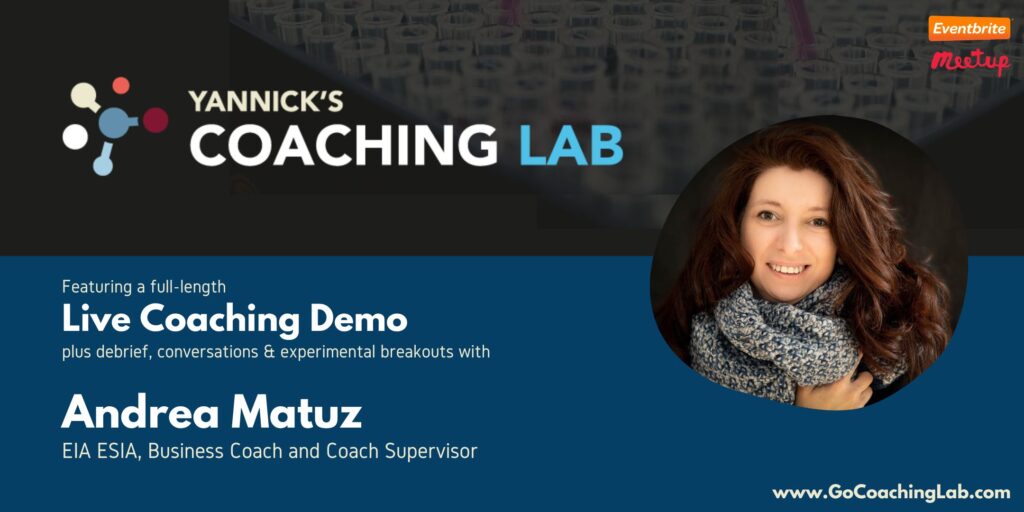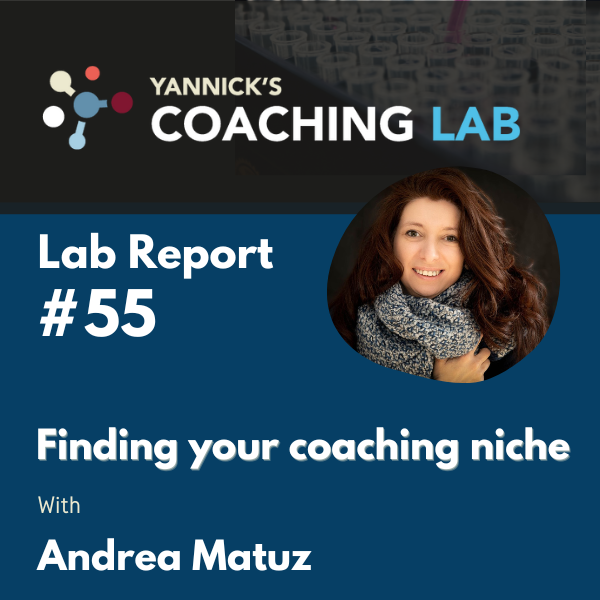
Yannick’s Coaching Lab features guest coaches from a broad variety of approaches, who showcase how they work as part of a live 45min coaching session, followed by reflections and Q&A with the audience.
Curious to know what this session was like? Have a peek at the Lab Report below or consider VIP membership to access the full recording of this and many more exciting sessions.
Yannick’s Coaching Lab #55 — Andrea Matuz
Lab Report by Natalie Fraser
Session Summary
Prior to the session, Andrea and her client met briefly to check in about the focus and their relationship. Andrea also looked at Andrea’s online presence. Andrea’s client is dedicated to supporting women moving from burnout towards joy and excitement. She has resisted niching but stated that she knows that she needs to. This is something that she has revisited numerous times yet feels that her messaging isn’t clear and that there is a gap between the message she’s putting out and the client she’s getting. Her underlying issue is that she would like more clients to make her business more financially successful. The client’s key insights during the session were that the community rather than the content are what is most important for her moving forward. “I want to earn money and expand my client base” transformed towards “I want to develop something organic and community focused”.
Key questions identified for the session were:
“What’s stopping me from ‘nailing my coaching niche’?”
“What is my elevator pitch?”
Key Moments
What is the question you’re bringing? The client began answering this question, “what stopping me…” before detouring from this. Andrea asked her client to finish this sentence [see above], before asking the following questions:
What does ‘nailing it’ mean to you?
Why is niching important to you?
These questions invited the client to reflect that they do not know, and hope that achieving these will give her a “superpower” to get loads of clients in. Andrea held silence for her client to sit with this realization. This allowed emotion rather than action themes to emerge: for this to become easier and more enjoyable.
Andrea’s client described herself as “98%” there, leading Andrea to ask the client: What’s the 2% that’s missing? The metaphor of going down a water slide without water came up for the client, which Andrea continued using in their exploration: if the 2% is the water, then what is the water?
If you put aside the coaching elements (niching, elevator pitch) and bring in you personal creativity and interests, what does this mean in relation to your goal [see above]? What would you be doing? This question led to the client seeing her potential beyond her coaching work such as a course that she’s been developing and creating a community. Again, Andrea did not intervene and gave space for the client to notice her feelings in relation to this insight.
The concept of community raised the client to reflect on her preference for organic genuine development vs. “fake” development through niching.
You can do it your way. Andrea stated clearly this message, suggesting that you don’t need to listen to how others or ‘experts’ do things but rather to listen to your philosophy. Andrea framed this using the client’s own words of “being in their own zone of brilliance”.
If you had a strategy, is there something stopping you? The client reflected that this session had given her the insight that she can, yet Andrea sensed “I can but…”. Interestingly as they both spoke the client gently said, “what if I fail?” which Andrea missed. The discussion continued exploring what the “but” might be and the client did not repeat this. During the group discussion, the client reflected on how she “hid it away” and that this may be a past narrative that she felt she’d overcome yet may still be lingering.
Having recognized that creating community via a course rather than simply developing a large coaching client base is most important, Andrea asked would [client] feel in her ‘zone of brilliance’ within this course? This immediately highlighted what the client’s values and meaning are.
Andrea expanded on this, asking what would this space look like? Enabling the client to clearly state adjectives and values linked to her meaning of giving oneself permission to be true to themselves and what they stand for. Having arrived at insights that suggest a niche is not the goal, Andrea’s client concluded that this community would be her niche. Andrea challenged this by asking “but what’s a niche?” sharing her insights of what a niche is.
Is there anybody around you that can support you in this work? Andrea acknowledged that this was a closed question, yet is was one which felt relevant to the client who reflected how important it was to remember who is. This was explored in relation to what will enable you to continue this work?
Andrea closed the session by asking What would be a good way for us to finish the session? Leading the client to share how valuable walks are for her to process and release her dilemmas, where she feels in her zone of brilliance.
Insights & Take-Aways
The client’s key reflection was that she gained a sense of calmness “like I’ve just been on a retreat” and how important finding herself within this was.
The coach’s key reflection was how important it was to find her client’s self within the career.
Andrea asking the client what her ‘zone of brilliance’ was felt meaningful to her client, who is in the process of trademarking this term and has never been asked this before as she is usually in the position of asking others.
As the discussion explored themes that were not picked up on, Andrea shared the insight that “If a theme is important enough, it will come back.”
Reflecting on a significant moment that due to connection was missed [see “I can but…” above] the pros and cons of zoom vs. in-person was considered.
During the session, the client offered to share their pitch which Andrea did not take up on. Andrea reflected that this could have led more to a mentoring and doing yet there were more important things about beliefs that could be addressed first.
Andrea favors exploring what a client really needs over following what coaching bodies tell her she should do, such as SMART goals.
Andrea’s choice to close sessions by considering what will enable clients to continue the work relates to Andrea’s recognition that the coaching session opens doors for far deeper work to occur beyond the session.
Andrea has a fluid coaching mentoring style which emerges based on the session rather than as a routine process. Experienced as both a coach and mentor separately, Andrea shared some of her distinctions between the two.
A list of all available recordings can be found at https://bit.ly/LabRecordings
This Lab Report was authored by Natalie Fraser
Natalie is an existential Counselling Psychologist, specialising in trauma and transformation, and curious about coaching. Interested in exploring life’s Big Questions? Find out more at: www.existentialofferings.com

